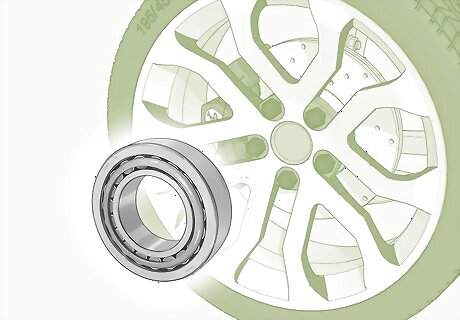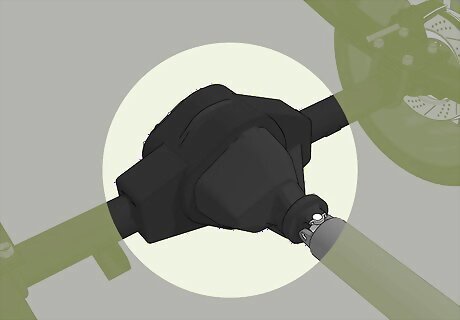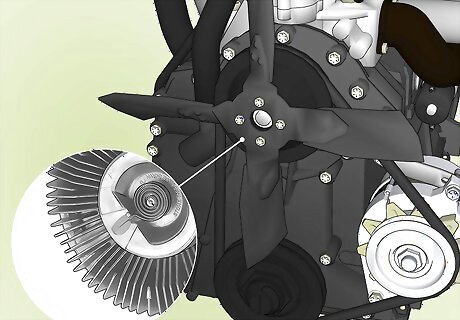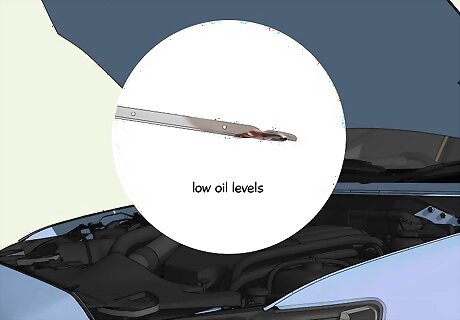
views
Uneven Tire Wear/Cupping

Tires are supposed to wear out evenly over time, but if you don’t rotate them, fix alignment problems, or get your suspension adjusted when it’s time for a tune-up, the tires can experience uneven wear. Eventually, the uneven friction will start to make noise—usually a screeching. However, this noise will sound like a humming if your tires begin cupping, which is where small symmetrical dents get worn out of the rubber. Other Symptoms: You see dark and light spots around the edges of your tires, you only hear noise coming from one side of your vehicle, and/or your steering wheel vibrates at high speeds. What It Sounds Like: Uneven wear will usually sound like screeching or grinding, but cupping will produce a deep humming noise. The Solution: Uneven tire patterns are a symptom of a bad alignment or suspension issues. See a mechanic to have the worn tires replaced and ask them to adjust your alignment or suspension.
Faulty Wheel Bearings

Inside each of your wheel assemblies there are bearings that help the tire spin freely and smoothly on the hub. If any of those bearings are dislodged, damaged, or exceptionally dirty, the wheel will make noise. This noise will become louder the faster you go as the wheel spins faster and produces more friction. Other Symptoms: The sound is especially noticeable when you turn a corner or swerve. You may also hear the noise coming from one corner or side of your vehicle only. Finally, your ABS light may pop on and you may have less steering control. What It Sounds Like: A repetitive grumbling or growling noise that bleeds out into a low hum at high speeds. The Solution: See a mechanic to have the damaged bearings replaced. Worst case scenario, you may need to have your drivetrain replaced.
Differential Issues

Your differential is responsible for helping your tires turn at different speeds when you turn. If your wheels were all spinning at the same speed, you’d have trouble angling and the tires would fight against one another. So, if your differential isn’t controlling your wheel speed properly, you’ll hear a humming noise that gets louder the faster you go as the difference between the wheel speed produces friction. Other Symptoms: The sound goes away when you’re coasting (since the differential disengages) or when you’re driving perfectly straight. You may also notice steering wheel vibrations and a rattling feeling when you turn. What It Sounds Like: A whirring, buzzing, and thrumming noise, which is especially loud when you turn the steering wheel. The Solution: The differential or the differential gearbox needs to be repaired or replaced, so see a mechanic.
Failing Fan Clutch

The fan clutch monitors and controls the airflow between your radiator and engine. Basically, it spins harder the faster you go because the faster you go the more heat you produce. If the fan clutch is damaged or it’s falling off of its bearing, it will make more noise when you travel at higher speeds. Other Symptoms: Your vehicle seems like it’s running hotter than it should be. The check engine light may pop on depending on the length of the damage. You’ll likely notice poor engine performance and worsening fuel economy, too. What It Sounds Like: A deep hum followed by occasional clunking. The noise will be located clearly in the engine bay. The Solution: The fan clutch must be replaced. See a professional to have the old fan clutch swapped out.
Alternator Belt Problems

The alternator belt, also known as the serpentine belt, loops around several pulleys inside of your engine bay to power the water pump, power steering, crankshaft, and fan clutch. If that belt is cracked or worn down, it may rub against one of the pulleys in a funny way and produce a humming noise. Fix this problem soon, since a worn-down belt is prone to snapping and a snapped alternator belt can lead to costly repairs. Other Symptoms: You’re probably not going to notice anything else beyond the noise in your engine bay. What It Sounds Like: A consistent grinding, humming, or cracking noise. The Solution: This happens naturally when the alternator belt is nearing the end of its life. Either replace the belt yourself, or take it to a mechanic and have them do it. This is an easy fix.
Exhaust System Leak

Your exhaust system is a collection of pipes, sensors, and connectors that get rid of your engine’s exhaust. If there’s a tear or a leak somewhere, that pressurized air will shoot out of the gap at a high speed and produce a strange noise. Other Symptoms: You may notice thin plumes of smoke or dark air coming out of your engine bay or underneath your car. Your check engine light may also pop on, or you may notice nasty odors in your car cabin. What It Sounds Like: Some folks will call this a humming noise but for most people, it’ll sound more like a higher-pitched “woo.” The Solution: The exhaust system needs to be tested and examined by a pro, so take the vehicle to a mechanic.
Dry or Damaged CV Joint

The CV (constant velocity) joint connects your car’s transmission to the drive wheels, and each wheel that’s connected to the drivetrain has a CV joint. If one of those joints is cracked, dried out (i.e. needs lubrication), or damaged, it’ll start to make noise. Other Symptoms: Your steering wheel vibrates at a higher speed. You may notice turning to one side feels kind of funny. What It Sounds Like: It’ll resemble a knocking noise when you turn, and an occasional deep hum whenever you move the wheel. The Solution: See a mechanic. It’s possible your CV joints just need to be greased. However, if there’s any damage, the joint needs to be replaced.
Bad/Low Oil

Oil keeps the components inside of the engine lubricated. This reduces friction, which improves performance and prevents overheating. So, if your oil levels are low or you’ve put the wrong kind of oil in your engine, your engine’s components may begin to make noise as they struggle to operate correctly. Other Symptoms: Your check engine light and/or oil level light pop on, you smell something burning, you experience stalling, or the engine misfires. What It Sounds Like: This won’t always be a humming noise. It may be more of a grinding or rumbling, but at idle it’ll usually sound like a tinny hum. The Solution: If you know you’re using the right oil for your engine, check the dipstick to confirm you don’t need to add more oil. If it’s time for an oil change, go ahead and change your oil. If you think you may have added the wrong oil, see a mechanic to have them bleed and clean the engine.
















Comments
0 comment